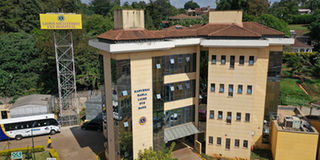Cornea demand exceeds supply in Kenyan eye hospitals
Sponsored by Lions SightFirst Eye Hospital

With the demand for corneal transplants in Kenya rising beyond 1,000, hospitals in the country are grappling with what to make of it.
The cornea is the transparent part of the eye that covers the iris and the pupil. It plays a key role in vision. Its main job is to help your eyes focus. It has a slight curvature. As the light enters your eye, the shape of the cornea refracts (bends) it. The curve helps your eye focus on objects that are close or far away.
In simple terms, the cornea is the window of the eye, and focuses most of the light that enters the eye.
Disease, infection or injuries may damage the cornea. When that happens, scars or discolouration can form.
Damage to the cornea can block or distort light as it enters your eye. Your cornea can also become cloudy and your vision may blur. That is when vision problems start.
According to Lions SightFirst Eye Hospital, most of the recipients of corneas are black Kenyans, who, incidentally, do not subscribe to the idea of donating the organ once they die. The hospital is appealing to Kenyans to pledge their corneas so they can help blind people who wait for years to get them.

The cost of corneal transplant is Ksh200,000 in outpatient centres. Lions Firstsight Eye Hospital accepts the National Hospital Insurance Fund (NHIF) cards.
The hospital says patients with problems in both eyes are treated in one eye to give others a chance.
The hospital gives prevalence to school-going children, reasoning that they will benefit more than elderly people.
The hospital has an eye bank where the cornea is processed and kept for use on demand. “We harvest the cornea from the donors, assess them by checking their self-density, and do analytics on the therapeutic value of the organ,” says a cornea retrieval specialist at the hospital.

Once the cornea is harvested, a cell count is done to determine its wellness, because not all that is harvested are used for transplant. Some may not be in usable condition.
“To get a cornea from the donor, a kind of an agreement must be entered. We must get the consent of the donor, who will be made to sign a card provided by the hospital,” says the specialist.
The card he is referring to states in part: “I desire that my eyes be donated to the Lions eye bank within six hours of my death. I would like to help someone see after my death.”
The specialist explains that once the cornea has been removed from the dead person, an artificial one is placed into the eye to give it form.
Lions Firstsight Eye Hospital in Nairobi is the only facility that has an eye bank in East and Central Africa.
Corneal problems include a scratched cornea, keratoconus and corneal dystrophies, including Fuchs’ dystrophy.
Pledge to donate your cornea today to give sight to those in need.


